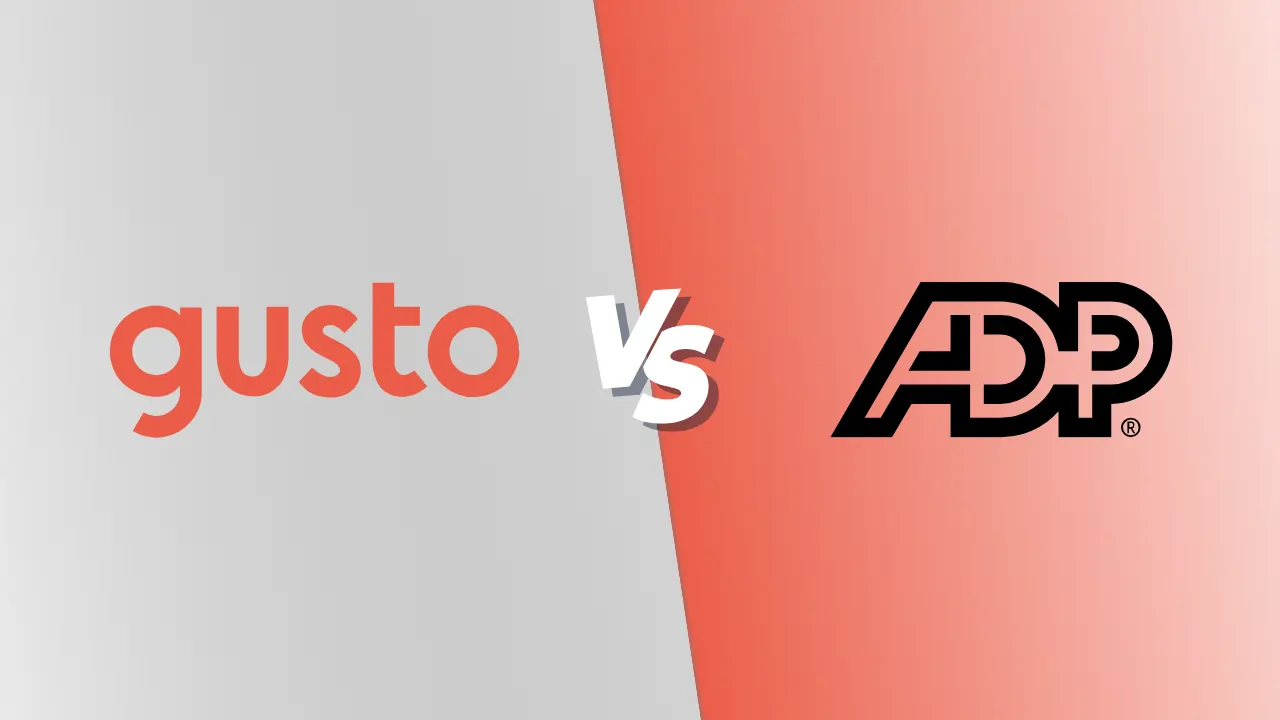The Top Payroll Services for Businesses Under 20 Employees
Last updated: February 2026
As a small business owner or manager, effectively managing payroll is crucial for your company's financial health and employee satisfaction. Payroll isn't just about paying your employees on time; it's about maintaining compliance with tax regulations, keeping accurate records, and ensuring that your business operates efficiently.
- Used by over 400,000 SMBs globally
- Automated payroll with tax filing included
- Direct deposit and contractor payments fast
- Advanced features included
- Flexible and customized packages
- Tax filing & payroll automation
- Award-Winning SMB Solution
- Over 45 years of excellence
- Easy to pay and manage employees
- SMBs most trusted advisor
- Winners of 2 Gold Stevie awards
- 351K worksite employees
- All-in-one HR solution for success
- Used by 2.5M users & 40K+ businesses
- Vast partner network
- All plans include extensive payroll features
- Offers third-party HR tools
- Try free for 30 days
- Payroll made easy for as little as $1 per day
- Automated payroll for business efficiency
- US-based customer support
Why Payroll Services and Software Are Crucial for Small Businesses
Managing payroll in-house can be complex and time-consuming, especially for small businesses. Manual processing increases the risk of errors, compliance issues, and inefficiencies. Here’s why investing in a payroll service or payroll software is essential for small businesses:
1. Accuracy in Payments and Deductions
Small business owners need to ensure employees are paid accurately and on time, including overtime, bonuses, and commissions. Payroll software automates calculations and correctly calculates deductions (such as taxes, insurance, and retirement contributions). This avoids errors that could lead to employee dissatisfaction or costly legal issues.
2. Compliance with Tax Regulations
Small businesses must comply with federal, state, and local tax regulations. Payroll services help you meet all tax obligations, automatically calculating, withholding, and filing taxes on your behalf. Staying compliant avoids penalties and fines that can disrupt small businesses with tight budgets.
3. Time Savings
Manual payroll processing takes valuable time away from running your business. With payroll software, small business owners can automate repetitive tasks, such as calculating wages and tax filings, allowing you to focus on business growth and operations.
4. Reducing Errors
Payroll errors, such as incorrect calculations or missed tax payments, can be costly. Payroll services help reduce these errors through automation, ensuring that payroll is processed accurately every time, and mitigating risks like tax miscalculations or missed filing deadlines.
5. Improving Employee Satisfaction
Ensuring employees are paid accurately and on time is critical to maintaining employee satisfaction. Payroll services help avoid late or incorrect payments, which can hurt morale and increase turnover, especially in small businesses where employee loyalty is key.
6. Comprehensive Record-Keeping
Payroll services securely store important payroll data, such as employee pay stubs, tax forms, and records of hours worked. This data is essential for maintaining compliance, preparing for audits, and making informed business decisions.
Compare Best Payroll Software For Small Businesses
 Seamless payroll automation
Seamless payroll automation  Financial insights in real-time
Financial insights in real-time  Used by over 400,000 SMBs globally
Used by over 400,000 SMBs globally  Automated payroll with tax filing included
Automated payroll with tax filing included  Automatic compliance and tax-filing
Automatic compliance and tax-filing  Built for all sizes, from small businesses to large
Built for all sizes, from small businesses to large  All-in-one HR solution for success
All-in-one HR solution for success  Used by 2.5M users & 40K+ businesses
Used by 2.5M users & 40K+ businesses  All plans include extensive payroll features
All plans include extensive payroll features  Offers third-party HR tools
Offers third-party HR tools  Payroll made easy for as little as $1 per day
Payroll made easy for as little as $1 per day  Automated payroll for business efficiency
Automated payroll for business efficiency 





Features
Payroll Features
Automation Features
HR Features
Tax Features
Integrations
Pros & Cons
Pros
Cons






Features
Payroll Features
Automation Features
HR Features
Tax Features
Integrations
Pros & Cons
Pros
Cons






Features
Payroll Features
Automation Features
HR Features
Tax Features
Integrations
Pros & Cons
Pros
Cons






Features
Payroll Features
Automation Features
HR Features
Tax Features
Integrations
Pros & Cons
Pros
Cons






Features
Payroll Features
Automation Features
HR Features
Tax Features
Integrations
Pros & Cons
Pros
Cons






Features
Payroll Features
Automation Features
HR Features
Tax Features
Integrations
Pros & Cons
Pros
Cons
| Provider | Accounting | Time Tracking | Point of Sale | 24/7 Support | Phone Support | Automated Payroll Tax Filing | Automated W-2 / 1099 Filing | Time Tracking Built-In | Time Tracking Add-On | Time Tracking Integration |
| Gusto | V | V | V | X | V | V | V | V | X | V |
| Paycor | V | V | V | X | V | V | V | X | V | V |
| Rippling | V | V | V | X | V | V | V | X | V | V |
| Justworks | V | V | X | X | V | V | V | X | V | V |
| QuickBooks | V | V | V | X | V | V | V | X | V | V |
| Paychex | V | V | V | V | V | V | V | X | V | V |
| OnPay | V | V | X | X | V | V | V | X | X | V |
| TriNet | V | V | V | V | V | V | V | X | V | V |
| SurePayroll | V | V | X | X | V | X | X | X | X | V |
Understanding Small Business Payroll Services: More Than Just Processing Paychecks
Modern payroll services do more than just process payments; they offer a range of features that help streamline business operations:
- Wage and Salary Calculations: Automates the calculation of regular pay, overtime, bonuses, and commissions.
- Tax Withholding and Filings: Automatically calculates and files federal, state, and local taxes.
- Direct Deposit and Payment Options: Supports secure electronic payments via direct deposit and other methods.
- Pay Stub and Tax Form Generation: Automates the creation and distribution of pay stubs and year-end tax forms like W-2s and 1099s.
- Time and Attendance Tracking: Integrates with time-tracking systems for accurate labor cost management.
- Benefits Administration: Manages employee benefits, such as health insurance and retirement plans.
- Compliance Management: Stays up-to-date with changing labor laws and regulations to ensure legal compliance.
- Reporting and Analytics: Provide valuable insights into labor costs, employee turnover, and other key metrics.
By leveraging these features, small businesses can save time, reduce errors, and gain valuable insights into workforce management.
Related Articles
Types of Small Business Payroll Services: Finding the Right Fit for Your Business
Small businesses have several options when it comes to managing payroll:
1. In-House Payroll Processing
Pros:
- Complete control over payroll.
- Potentially lower costs for very small businesses.
Cons:
- Time-consuming and requires in-depth knowledge of tax laws.
- Higher risk of errors and compliance issues.
Best for: Very small businesses with simple payroll needs and someone on staff with payroll expertise.
2. Outsourced Payroll Services
Pros:
- Expertise in tax compliance and payroll processing.
- Saves time and reduces the risk of penalties.
Cons:
- Can be more expensive than DIY options.
- Less direct control over payroll processes.
Best for: Small businesses looking to save time while ensuring compliance.
3. Hybrid Payroll Solutions
Pros:
- Flexibility to handle some tasks in-house while outsourcing others.
- Balances control and expertise.
Cons:
- Requires clear communication and delineation of tasks.
Best for: Growing businesses that need support with complex payroll tasks but want to retain some control.
Key Features to Look for in Payroll Services
When choosing small business payroll software or services, consider these essential features:
- Automated Calculations: Handles complex payroll calculations for taxes, deductions, and different pay types.
- Tax Filing and Compliance: Automatically calculates, files, and pays taxes.
- Direct Deposit: Ensures timely, secure payments to employees’ bank accounts.
- Employee Self-Service Portal: Allows employees to view pay stubs, tax forms, and update personal information.
- Mobile Access: Lets you manage payroll from anywhere, a must for business owners on the go.
- Integration with Accounting Software: Synchronizes payroll data with your accounting system for seamless financial management.
- Compliance Updates: Keeps up with changes in labor laws and tax regulations.
- Scalability: Accommodates business growth and increasing payroll complexity.
Benefits of Using Payroll Services for Small Businesses
Investing in a payroll service offers multiple benefits, including:
- Time Savings: Automating payroll tasks frees up time to focus on running your business.
- Improved Accuracy: Automation reduces errors in payroll calculations and tax filings.
- Enhanced Compliance: Stay current with tax laws and avoid penalties.
- Employee Satisfaction: On-time, accurate payments improve morale.
- Data Security: Protect sensitive employee information through encryption and secure data handling.
- Cost Savings: More economical than hiring a full-time payroll administrator.
- Scalability: Payroll services can grow with your business, handling more employees and complex pay structures.
- Expert Support: Access professional help when needed to resolve complex payroll issues.
Potential Drawbacks of Payroll Services
While payroll services provide numerous benefits, there are some potential drawbacks:
- Cost: Some payroll services may be expensive for very small businesses.
- Less Control: Outsourcing payroll may reduce direct oversight of the process.
- Integration Challenges: Syncing payroll software with existing systems like accounting or HR can sometimes be challenging.
How to Choose the Best Payroll Service for Your Small Business
Managing payroll can be one of small business owners’ most complex and time-consuming tasks. As your business grows, so do the intricacies of payroll management, including tax compliance, employee benefits, and record-keeping. Choosing the right payroll service can streamline these processes, save you time, and ensure compliance with regulations. Here’s a comprehensive guide to help you select the best payroll service for your small business.
When selecting a payroll service, follow these steps:
- Assess Your Payroll Needs: Consider your business size, payroll complexity, and compliance requirements.
- Set a Budget: Determine how much you’re willing to spend on payroll services, factoring in long-term value.
- Compare Features: Evaluate providers based on features like tax filing, automation, and reporting.
- Check Integrations: Ensure compatibility with your existing accounting or HR systems.
- Review Customer Support: Choose a service with reliable customer support that can assist when needed.
- Try Before You Buy: Many payroll providers offer demos or trials—take advantage of these to test usability.
- Plan for Growth: Choose a service that can scale with your business as it expands.
Compliance and Data Security Considerations
Payroll services must ensure compliance with various regulations, including federal, state, and local tax laws, labor laws, and worker classifications. Additionally, safeguarding sensitive payroll data through encryption and access controls is essential to protect against data breaches.
Conclusion
Managing payroll efficiently is crucial for small business success. Whether you handle payroll in-house or outsource it, a professional payroll service ensures compliance, saves time, reduces errors, and improves employee satisfaction. As your business grows, a scalable payroll solution becomes even more important for maintaining financial health and operational efficiency. Choose a payroll service that fits your specific needs and empowers your business to thrive.







